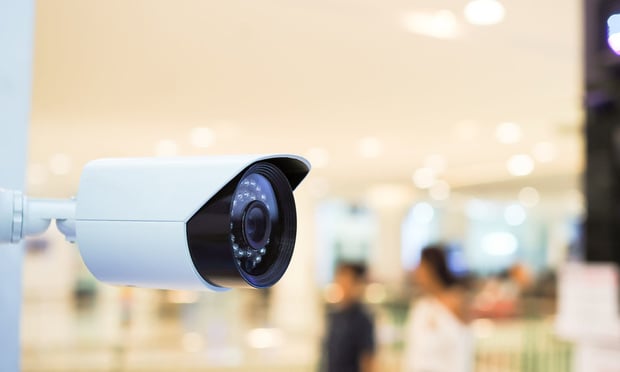Court Says ShopRite's Deletion of Video Following Slip-and-Fall Was Spoliation
A three-judge appeals panel ordered a new trial for plaintiff Harriet Marshall because the Philadelphia Court of Common Pleas judge who oversaw her first trial failed to give the jury an adverse inference instruction based on defendant ShopRite's spoliation of evidence.
March 28, 2019 at 01:11 PM
4 minute read
 Credit: Thanwarat Tangthawilap/Shutterstock.com
Credit: Thanwarat Tangthawilap/Shutterstock.com
A grocery store that deleted surveillance footage of all but about 37 minutes before and 20 minutes after a slip-and-fall spoliated evidence because by that time it had already received a letter from plaintiffs counsel requesting footage of a significantly longer time span, the Pennsylvania Superior Court ruled.
In Marshall v. Brown's IA, a three-judge appeals panel ordered a new trial for plaintiff Harriet Marshall because the Philadelphia Court of Common Pleas judge who oversaw her first trial failed to give the jury an adverse inference instruction based on defendant ShopRite's spoliation of evidence.
According to the panel's March 27 published opinion, Marshall slipped on water and fell in the produce aisle of the Island Avenue ShopRite in Philadelphia, aggravating a pre-existing injury to her hip and back. About two weeks later, ShopRite received a letter from Marshall's attorney requesting footage of the six hours before and the three hours after Marshall's fall.
The letter, according to the opinion, warned, “'If any of the above evidence exists, and you fail to maintain same until the disposition of this claim, it will be assumed that you have intentionally destroyed and/or disposed of evidence. Please be advised that you are not permitted, and are in no position, to decide what evidence plaintiff would like to review for this case. Accordingly, discarding any of the above evidence will lead to an adverse inference against you in this matter.'”
ShopRite, however, preserved only about 37 minutes before and 20 minutes after Marshall's fall, the court said.
The case proceeded to a trial and a jury found in favor of the defense. Marshall appealed, arguing that she was prejudiced by the trial court's refusal to give a spoliation instruction to the jury.
The appeals panel, led by Judge Mary Jane Bowes, agreed, finding that the letter from Marshall's attorney had “placed ShopRite on notice to preserve the video surveillance prior to and after the fall as it was arguably relevant to impending litigation” and that ShopRite had ”consciously decided to preserve only a fraction of the video requested because, as a 'rule of thumb,' it usually retained only 20 minutes of video prior to a fall, and 20 minutes after.”
“ShopRite's conduct herein constituted spoliation,” Bowes said. “We agree with Ms. Marshall that the video surveillance tape depicting the events in the several hours prior to her fall was relevant for showing far more than the offending substance on the floor. Additional probative value lay in demonstrating what steps, if any, ShopRite and its employees took to make the premises reasonably safe for business visitors such as Ms. Marshall in the hours leading up to the fall. Arguably, such evidence was relevant to showing knowledge, constructive notice, and a lack of care for the safety of invitees.”
Bowes was joined by Judges Victor Stabile and Maria McLaughlin.
The appeals panel also took issue with the trial court's determination that ShopRite did not spoliate evidence because it did not act in bad faith.
“Spoliation may be negligent, reckless, or intentional; a party's good or bad faith in the destruction of potentially relevant evidence goes to the type of sanction that should be imposed, not whether a sanction is warranted,” Bowes said, adding, “Ms. Marshall asked the court for the least severe spoliation sanction, an adverse inference instruction. On the facts herein, it was warranted, and the court abused its discretion in refusing the charge.”
Counsel for Marshall, Marc Greenfield of Spear, Greenfield, Richman Weitz & Taggart in Philadelphia, could not be reached for comment.
Thomas Bradley of McBreen & Kopko in Philadelphia represented Brown's IA, which owns the Island Avenue ShopRite. He also could not be reached for comment.
(Copies of the 15-page opinion in Marshall v. Brown's IA LLC, PICS No. 19-03883, are available at http://at.law.com/PICS.)
This content has been archived. It is available through our partners, LexisNexis® and Bloomberg Law.
To view this content, please continue to their sites.
Not a Lexis Subscriber?
Subscribe Now
Not a Bloomberg Law Subscriber?
Subscribe Now
NOT FOR REPRINT
© 2025 ALM Global, LLC, All Rights Reserved. Request academic re-use from www.copyright.com. All other uses, submit a request to [email protected]. For more information visit Asset & Logo Licensing.
You Might Like
View All


Stevens & Lee Hires Ex-Middle District of Pennsylvania U.S. Attorney as White-Collar Co-Chair
3 minute read
Judge Tanks Prevailing Pittsburgh Attorneys' $2.45M Fee Request to $250K
5 minute readTrending Stories
- 1Law Firms Expand Scope of Immigration Expertise, Amid Blitz of Trump Orders
- 2Latest Boutique Combination in Florida Continues Am Law 200 Merger Activity
- 3Sarno da Costa D’Aniello Maceri LLC Announces Addition of New Office in Eatontown, NJ, and Named Partner
- 4Friday Newspaper
- 5Public Notices/Calendars
Who Got The Work
J. Brugh Lower of Gibbons has entered an appearance for industrial equipment supplier Devco Corporation in a pending trademark infringement lawsuit. The suit, accusing the defendant of selling knock-off Graco products, was filed Dec. 18 in New Jersey District Court by Rivkin Radler on behalf of Graco Inc. and Graco Minnesota. The case, assigned to U.S. District Judge Zahid N. Quraishi, is 3:24-cv-11294, Graco Inc. et al v. Devco Corporation.
Who Got The Work
Rebecca Maller-Stein and Kent A. Yalowitz of Arnold & Porter Kaye Scholer have entered their appearances for Hanaco Venture Capital and its executives, Lior Prosor and David Frankel, in a pending securities lawsuit. The action, filed on Dec. 24 in New York Southern District Court by Zell, Aron & Co. on behalf of Goldeneye Advisors, accuses the defendants of negligently and fraudulently managing the plaintiff's $1 million investment. The case, assigned to U.S. District Judge Vernon S. Broderick, is 1:24-cv-09918, Goldeneye Advisors, LLC v. Hanaco Venture Capital, Ltd. et al.
Who Got The Work
Attorneys from A&O Shearman has stepped in as defense counsel for Toronto-Dominion Bank and other defendants in a pending securities class action. The suit, filed Dec. 11 in New York Southern District Court by Bleichmar Fonti & Auld, accuses the defendants of concealing the bank's 'pervasive' deficiencies in regards to its compliance with the Bank Secrecy Act and the quality of its anti-money laundering controls. The case, assigned to U.S. District Judge Arun Subramanian, is 1:24-cv-09445, Gonzalez v. The Toronto-Dominion Bank et al.
Who Got The Work
Crown Castle International, a Pennsylvania company providing shared communications infrastructure, has turned to Luke D. Wolf of Gordon Rees Scully Mansukhani to fend off a pending breach-of-contract lawsuit. The court action, filed Nov. 25 in Michigan Eastern District Court by Hooper Hathaway PC on behalf of The Town Residences LLC, accuses Crown Castle of failing to transfer approximately $30,000 in utility payments from T-Mobile in breach of a roof-top lease and assignment agreement. The case, assigned to U.S. District Judge Susan K. Declercq, is 2:24-cv-13131, The Town Residences LLC v. T-Mobile US, Inc. et al.
Who Got The Work
Wilfred P. Coronato and Daniel M. Schwartz of McCarter & English have stepped in as defense counsel to Electrolux Home Products Inc. in a pending product liability lawsuit. The court action, filed Nov. 26 in New York Eastern District Court by Poulos Lopiccolo PC and Nagel Rice LLP on behalf of David Stern, alleges that the defendant's refrigerators’ drawers and shelving repeatedly break and fall apart within months after purchase. The case, assigned to U.S. District Judge Joan M. Azrack, is 2:24-cv-08204, Stern v. Electrolux Home Products, Inc.
Featured Firms
Law Offices of Gary Martin Hays & Associates, P.C.
(470) 294-1674
Law Offices of Mark E. Salomone
(857) 444-6468
Smith & Hassler
(713) 739-1250





